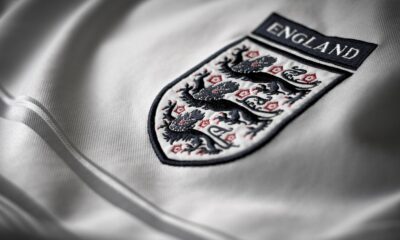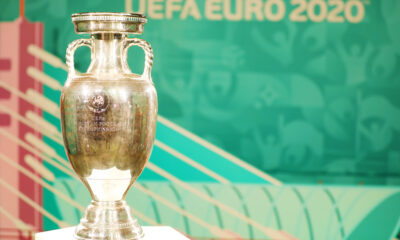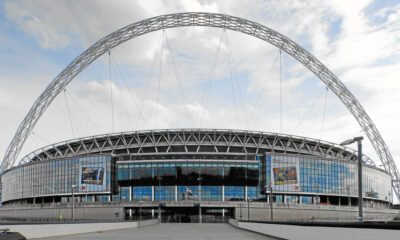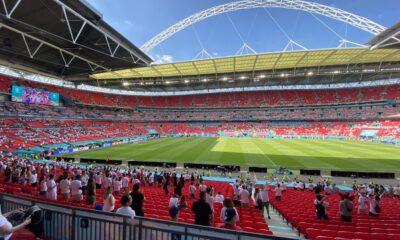Football
Paul Gascoigne – The Last World Class English Footballer?
Gazza's tears at Italia '90. pic.twitter.com/iBjz0oLzQH
— 90s Football (@90sfootball) July 8, 2018
Paul Gascoigne – The Last World Class English Footballer?
Monday (15th June) marked 24 years since Paul Gascoigne scored an amazing goal against Scotland at Wembley during the group stage of Euro 96. You know the one – Gazza makes his trademark lung-busting run from deep, gets found by a first-time pass from Darren Anderton, flips the ball over Colin Hendrie (planting the centre half on his backside in the process) and volleys the ball past Andy Goram into the net, giving England a 2-0 lead. This has led to an interesting debate amongst fans and pundits alike – could Paul Gascoigne actually be the last truly world class English footballer since 1966?
Paul Gascoigne Goal against Scotland Euro 96
What defines a world class player?
First of all, let’s establish what constitutes a world class footballer. To begin with, they are winners. Every top player has a list of honours to make the rest of the footballing world envious. They collect trophies like the average human collects DVDs, and they put in 10/10 performances regularly at club level and when they pull on their international shirt. Truly world class players have the ability to turn a game on its head in an instant. They produce a moment of magic when things are going badly for their team or the game has tailed off, turning it into something instantly memorable. They are the footballers who make even the neutral fans sit up and take notice, putting a smile on their face; they give a feeling of enjoyment to a spectator.
It must also be considered that being a true great can depend on the position in which players ply their trade. So what should we look for? How about goalkeepers constantly pulling off strings of miraculous saves? Defenders making goal-saving challenges and marking top strikers out of the game? Midfielders running the game with their positional play and wide range of passing while also chipping in with goals? Strikers, simply put, scoring goals. Repeatedly preying on opportunities afforded to them by their ability to evade defenders, but also having the creativity to carve a chance for themselves, increasingly these days from deeper positions than the “traditional number nine”? This seems reasonable…
Gascoigne certainly falls into these parameters; his name is synonymous with a workmanlike enthusiasm in the middle of the park and undeniable will to win seldom seen elsewhere. He could run with the ball at his feet, beat players as if they were standing still, thread a pass through the eye of a needle and most importantly, did so with a smile on his face. A cheeky Geordie smile that was infectious to all that watched him with the equal ability to go in for a tough tackle where required; a true entertainer on the pitch.
All this being said, it would be easy to say that because England haven’t won anything on the international stage for 54 years, a truly world class player hasn’t emerged from these shores since the days of Sir Geoff Hurst and Bobby Moore. In fact, England have fallen at the quarter-final stage four times since the victory over West Germany in 1966, including the infamous “Hand of God” incident of ’86 and the Ronaldinho free kick of 2002 which David Seaman likely still has nightmares about. This was our best return until the 4th-place finish in Russia two years ago. But would it be right to call any of the “Class of 2018” truly world class?
Maradona ‘Hand of God’ Goal 1986 World Cup
The key thing that set the 2018 squad aside from previous tournaments (except Euro 1996) is that there was a far greater sense of unity within the side. A feeling of cohesion and that team was out to play for each other without any egos showing through. But to that end, this doesn’t allow any of them to shine through as truly world class.
Harry Kane won the golden boot for the tournament with six goals but five of these came in the group stage against far inferior opposition (Tunisia, Panama) and the sixth was a penalty in the last 16. Coupled with his pair of Premier League Golden Boot awards, he is undeniably a top goal scorer and will likely chase down Wayne Rooney’s England goal record, but he hasn’t yet got the honours to make him truly world class. He is one of the rare players that, assuming his scoring record doesn’t subside, could get into this category with only two or three trophies in his cabinet.
Raheem Sterling has domestic honours. More than Gascoigne, in fact. He’s won PFA Young Player of the Year, two Premier League titles, the FA Cup, three League Cups and the Community Shield. To boot, he has a Premier League goal ratio better than one in three while operating from wide areas. But it cannot be ignored that over the last season and a half, Sterling goes missing in a game too often. And while his end product has undoubtedly improved under Pep Guardiola, he’s not quite at the point of being called truly world class. Should he make another step up in his performances following the impending departure of David Silva – not a small task – he may just earn that tag.
Maybe Trent Alexander-Arnold? 125 appearances for Liverpool in an undoubtedly meteoric rise to stardom, a Champions League winner (and runner up), UEFA Super Cup winner, Club World Cup winner and soon-to-be Premier League winner. 25 assists in less than two seasons in the senior. And he’s nailed down an England position at the age of 21. However, all of his star qualities are while he’s attacking. While there has been talk about Trent moving into midfield in the future, he is still a defender and his defensive work is still suspect. In fact, many believe he falls behind Aaron Wan-Bissaka in this department. Another one for the future then.
So how about the “Golden Generation”?
It seems ridiculous to think that an England side in which the spine consists of Ashley Cole, John Terry, Steven Gerrard, David Beckham, Paul Scholes, Frank Lampard, Michael Owen and Wayne Rooney – over 100 domestic honours between them -didn’t win a major competition. But at Euro 2004, where Sven Goran Eriksson’s side showcased an expansive style of football rarely seen from the Three Lions, this “Golden Generation” of players made it only as far as the quarter finals (sound familiar?) where they were knocked out on penalties (shock) by Portugal.
Tournament stats back up that England hugely underachieved in Portugal: no country scored more goals collectively, only Milan Baros scored more goals than an 18 year-old Wayne Rooney and only eventual winners Greece had more players named in Team of the Tournament. It was the biggest pool of English talent ever assembled at a major tournament, but can we consider any of them as world class given they didn’t get beyond the last eight?
The truth is…all of them are.
Look back to the start of this article – nowhere have we said that international trophies are a must if a player is to be classed as a world great. Given that the average career rarely spans five major tournaments, a maximum three of which are World Cups, it is impossible for every genuinely world class player to win international trophies.
No, Steven Gerrard never won the Premier League. But he won the Champions League in a team trailing 3-0 in the final at half time. No, Michael Owen didn’t win Europe’s highest club tournament. But he burst onto the club and international scene as a teenager, won the Ballon D’Or four days after his 22nd birthday, two Premier League Golden Boot awards and earned a big-money move to Real Madrid. And no, David Beckham never won the League Cup. But come on…need his list of other achievements in the game really be listed?
Beyond these comparably modest career omissions, this group of players won everything available to them in English club football and some of them also found success in foreign leagues including Ligue 1, MLS and La Liga. Even when they weren’t completely on form, they were 7/10 every week. They were match winners at either end of the pitch. All of them maintained the highest standards throughout their careers and aside from one or two off-field transgressions, will forever be regarded as legends of the English game.
Paul Gascoigne won PFA Young Player of the Year, the FA Cup, four major trophies in Scotland, and Scottish Writers and Footballers Player of the Year 1996. He won Sports Personality of the Year in 1990 and attracted a British record transfer when sold to Lazio for £2.2m. He had a goal ratio better than one in four from the base of midfield over his career and is an inductee of the English Football Hall of Fame. He is widely considered amongst former players and supporters worldwide as a world class player. But the idea that he is the last truly world class English player is absurd.
The somewhat hurtful truth, considering England hasn’t won an international trophy for 54 years (and counting), is that there has been a conveyor belt of world class English talent…and looking at the young home-grown players around Europe’s top leagues, this is almost certainly set to continue.
We hope you enjoyed the article ‘Paul Gascoigne – The Last World Class English Footballer?’ Where does Gazza rate in terms of England’s greatest footballers? Let us know!
Read more on football here:
-

 News2 weeks ago
News2 weeks agoThe Best Male Tennis Players of All Time
-

 Uncategorised2 weeks ago
Uncategorised2 weeks agoWhat Dinosaur Has 500 Teeth?
-

 Football2 weeks ago
Football2 weeks agoThe Best Penalty Takers of All Time
-

 News2 weeks ago
News2 weeks agoThe Fastest Rugby Players Ever
-

 Football2 weeks ago
Football2 weeks ago10 of the most underrated footballers in the world right now
-

 Football2 weeks ago
Football2 weeks agoPlayers with the most goals in a Premier League season
-

 Football2 weeks ago
Football2 weeks agoWho is the Fastest Football Player in the World?
-

 Football2 weeks ago
Football2 weeks agoChelsea’s Possible Lineup For Next Season

















